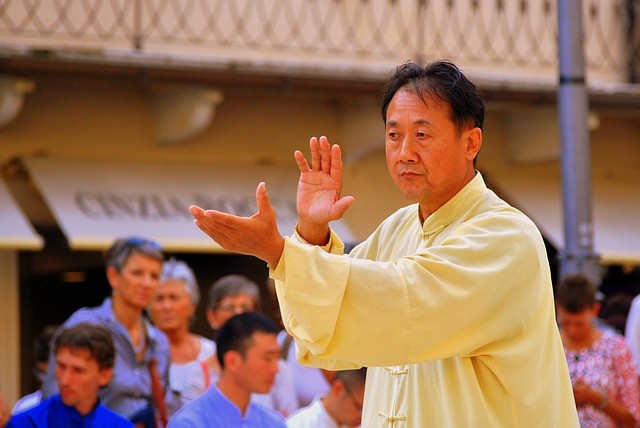WHAT IS IT? WHY DO IT? HOW CAN IT HELP?
Thanks to the COVID-19pandemic, most of us have needed to restrict or redefine our health and exercise efforts closer to home. Our gyms and workout studios either closed or are severely restricted and many turned to home based workouts like yoga, pilates and other video-based programs. The sale of treadmills, Peloton bikes and other interactive equipment have gone through the roof. We have also all been watching a lot of movies. Recently I watched ‘The Intern’ with Anne Hathaway and Robert DeNiro. The final scene shows the two of them in a park doing some form of odd movements. Years ago, I remember seeing this phenomenon of slow moving, mostly old people in a park in Seattle apparently catching dust motes or catching sunbeams and I wondered what they were doing. The answer is Tai Chi and it can even give your immune system a boost!

Tai Chi is a traditional Chinese practice incorporating medicine, martial arts and a philosophy of the mind-body connection. It has long been held to be one of the most powerful ways to improve both physical and mental health. Tai Chi involves sequences of slow flowing upper and lower body movements along with conscious breathing techniques, focused attention and mental imagery. It is believed these movements involve the flow of vital energy “chi or qi” which promotes healing. Those people I saw in that Seattle park were using these rhythmic movements to enhance their physical, mental and emotional health.
Cognitive Function
Age-related cognitive function was researched and publishes in the Journal of the American Geriatrics Society in 2014. Tai Chi was found to have significant beneficial effects in older adults, with or without pre-existing cognitive impairment and may even slow dementia. Dr. Peter Wayne, Research Director of the Osher Center for Integrative Medicine at Harvard University calls Tai Chi ‘meditation on wheels.’ “You’re getting all the cognitive pieces you might get from meditation-mental clarity and focus and positive thoughts and lower stress-but you’re also getting physical exercise.” Dr. Wayne has outlined his research in his book Harvard Medical School Guide to Tai Chi: 12 Weeks to a Healthy Body, Stronger Heart and a Sharper Mind. The same journal cited above found that posture, balance, flexibility and strength were all benefits of Tai Chi practice. They found that when a person practices Tai Chi for 12 to 26 weeks, 1 to 3 times per week, their fall incidence rate was reduced by 43%. This is of particular importance not only for an aging population but for stroke and Parkinson’s disease patients. A growing number of clinical studies have shown Tai Chi can offer significant relief from back, neck, arthritis and other chronic pain. In 82% of these studies, practicing Tai Chi improves mood, lowers anxiety and can be an effective depression treatment.

Immunity & Vaccine Response
Dr. Michael Irwin of the Mindful Awareness Research Center at UCLA performed over a dozen studies linking Tai Chi to lower rates of insomnia, depression and inflammation. The soothing effects of Tai Chi have been seen on the sympathetic nervous system (SNS), the flight, fight or freeze response to stress. Like aerobic exercise, Tai Chi elevates the heart rate and hormone levels linked to the SNS. Dr. Irwin also states “We’ve seen improved immunity to viruses and improved vaccine response among people who practice Tai Chi.” The mind-body approach compliments the vaccine with the application of relaxation techniques. Among Dr. Irwin’s other findings is that the overall fitness benefits for sedentary, overweight or others at risk for heart disease may exceed other more strenuous forms of exercise. It also lowers blood pressure and total cholesterol.
Heart Health
February has long been the month where heart disease awareness steps to the fore. Since the 1950’s Tai Chi became a widely researched form of exercise, most lending credence to the idea of benefits to wide-ranging groups of people with varying degrees of ability or fitness as well as a wide number of health conditions like COPD, HTN, inflammation, immunity, CHF and Parkinson’s disease. Balance, flexibility and a sharper mind are included in this list as well. Most Tai Chi is practiced standing, but there are modified versions that allow sitting which makes it highly adaptable for anyone. All of the arm movements and most of the leg movements can be accomplished while sitting. These movements, standing or sitting, can safely and gradually increase the strength of the heart muscle and other major muscle groups. The breathing techniques can increase intake oxygen lessening breathlessness and the focused attention practiced in meditation is a well-known stress reducer.
Those gestures I mentioned earlier actually have names like ‘Cloud Hands’ and ‘Lifting a Lute.’ Tai Chi is dance-like being both low impact yet rigorous. It can be individualized based on fitness levels and physical ability. It is not so much about the physical component as much as it is the mindfulness and meditative qualities that may explain its popularity, longevity and wide-ranging benefits. Heart disease can have many root causes and many types of treatment. Tai Chi is one more in the long list of remedies available for anyone to become or stay as healthy as possible. Senior centers, community centers, health clubs, the YMCA and YWCA, retirement community activity centers are all great resources for finding classes in your area. You-Tube and DVD’s are also available. Most in-person classes are one hour long and cost about $20. That’s a pretty good price for a great fitness solution.
Many NHS Solutions Interim Leaders have been part the the Phase I of the COVID-19 vaccination deployment. Our Interim Nurse Leaders have welcomed the opportunity to be vaccinated and while some have experienced side effects, the overall feedback is very positive. Contact us for more information or to discuss your next career opportunity in this high-demand and crucial field.
